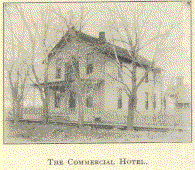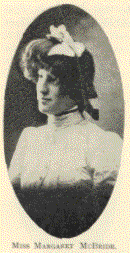 The Commercial Hotel of Jamestown is appreciated by those who have had the
good fortune to be numbered among its guests. The building was erected by J.E.
Fitzgerald in 1880, to supply the needs of the new and growing town, and was
christened "The Pomeroy," in honor of James, the son of Senator Pomeroy, but was
later changed to "The Commercial." The hotel was opened by a man named Norton,
and after various changes and vicissitudes of landlords and proprietors it fell
into the hands of Mrs. McBride, the subject of this sketch.
The Commercial Hotel of Jamestown is appreciated by those who have had the
good fortune to be numbered among its guests. The building was erected by J.E.
Fitzgerald in 1880, to supply the needs of the new and growing town, and was
christened "The Pomeroy," in honor of James, the son of Senator Pomeroy, but was
later changed to "The Commercial." The hotel was opened by a man named Norton,
and after various changes and vicissitudes of landlords and proprietors it fell
into the hands of Mrs. McBride, the subject of this sketch.
It had never before been a success, and when its present owner assumed control, the fortunes of this enterprise were at a very low ebb, and there was little to indicate the prosperity and popularity it now enjoys.
The neat and well appointed office, with its linoleum covered floor, was a dingy, dark room with smoke steeped walls and lighted by the glimmer of one small lamp. The present handsomely furnished parlor was of like character; instead of the rich velvet rug that now delights the eye, a hemp carpet strewn with ashes and coal dirt did duty as a covering for the floor; comfortable chairs have replaced the ordinary wooden ones, beautiful pictures decorate the walls, and the cheerless room that once passed under the name of "parlor," gives evidence of refined taste. The dining room contains a handsome veneered oak sideboard, bric-a-brac, elegant chandelier, soft carpet and rugs with bright papered walls as a background, are such as would adorn a home of refinement. The term "home" is applicable for the atmosphere of this little inn that seems to move along without the slightest friction, is permeated with a degree of rest and comfort not often found in hotels.
The patrons of the Commercial hotel must contrast with interest the present fitness of things as compared with the dining room under the previous management; for the floors were bare, the two long, crude, homemade tables were covered with dingy red linen, and the same faded material served as curtains for the windows. The two lamps with their smoked chimneys, did not shed much radiance over the equally scanty repast. The present best guests' sleeping apartment was furnished with two beds, bare floor, and a huge pan filled with ashes served as a cuspidor, while the slumbers of the commercial traveler, politician, candidate, or whoever chanced to come that way, were disturbed by a surfeit of bed bugs grazing over their anatomy. The property was a perfect wreck with neither well nor cistern.
Mrs. McBride bought the hotel during the hard years of 1893-94. She began without capital and for two years or more encountered many obstacles, but she furnished her house by degrees and as her little daughters, three in number, grew large enough to lend their assistance, her burdens were lightened, for no mother was ever blest with more dutiful or more devoted children. From 1896 until 1899 the crew of the Missouri Pacific pay car took their breakfasts at the Commercial hotel. Paymaster King ate his last Thanksgiving dinner there, and was lavish with his compliments of the service and spread. Superintendent Luke was also a guest on this occasion.
Mrs. McBride was born in Scotland and came with her parents to Kansas. She was married in 1882 to John McBride, by whom she had three children. The eldest daughter, Ada Lucile, is the wife of L.A. Tabor. The Tabors came from the state of New York to Kansas and were bankers in Holton and Blue Rapids. Since the death of their father, Ira Tabor, the three sons, R.A., L.A., Otis and a sister, Mrs. Frank Scott, are associated together in a bank at Irving, Kansas. L.A. Tabor followed railroad office work for twelve years, but one year ago purchased a fine farm one mile east of Irving, on the Big Blue river, and is in extensive wheat grower and stock raiser. The Tabors are all men of high honor, good business qualifications and strict integrity. Margaret and Gloria, the second and third daughters, sixteen and fourteen respectively, are excellent students and make the best of their educational advantages. They are both graduates of the common school branches, Gloria received a diploma, which represented the highest honors in her class. Margaret is a faithful student and the possessor of an exceptionally bright mind, but the lack of physical strength has partly retarded her progress.
 MISS GLORIA McBRIDE. |
 MISS MARGARET McBRIDE. |
Mrs. McBride is of Scotch birth. Her parents were Andrew and Jane Downey (Frain) Muir, who emigrated from Scotland, their native land, in 1865. They settled in Newcastle on the Beaver river, in the state of Pennsylvania. Two years later they removed to Sharon, Mercer county. Andrew Muir was born April 27, 1831, in Kirk Muir Hill, Lanarkshire, and when twelve years of age removed to Chapel Hill, which was his permanent home, and where Mrs. McBride was born and lived until coming to America. The annals of Scotland show that the Muirs were prominent in that country among the landed gentry. They descended from titled and wealthy noblemen and "Kirk Muir Hill" was named for them. In that historical place occurred the births of preceding generations, as far back as the records can be traced. They owned large landed estates, and were fine stockmen and horsemen. They are of the same lineage as John Muir, the noted Scotch Presbyterian clergyman. The Muirs were a religious people, devoted to their church. Mrs. McBride's father was a ruling elder and led the choir in the most prominent church of Chapel Hill. He was a man of fine personality and a musician of considerable note. He was engaged in the coal mining industry and having followed that vocation since his youth, he was well fitted to operate with practical success. Mr. Muir superintended a colony of over two thousand workmen and not having so many officials as there would be in a similar enterprise in this country, he paid the salaries to the employes personally.
After locating in Pennsylvania he was with the Pierce Coal Mining Company and for several years sunk shafts and opened new mines at both Newcastle and Sharon. He later superintended the coke ovens of A.J. Egbert in Mercer and Venango counties. McBride's maternal grandfather was an employe in the house of Butry and while with them in the West Indies was kicked by a horse and died from the injury several months subsequently. His pay went on and his wife continued to draw his salary until she married again. By her marriage to Mr. Wilson two sons were born; the eldest of whom learned the mining business from Mrs. McBride's father, succeeded to his position when Mr. Muir left Scotland and was manager of the same coal colony until his death a few months ago. The other brother was a railroad conductor in Scotland.
Mrs. McBride is one of ten children, all are living and prosperous. There are six sons and four daughters. Five of her brothers are Rooks county farmers. The sixth lives near Portland, Oregon. One sister is a resident of Kansas City, one in Franklin City, Venango county, Pennsylvania, and the other near Jamestown. In 1878 the eldest son and brother, Andrew L., emigrated west and located in Stockton, when that town consisted of but one cabin. Soon after he homesteaded there another brother followed. This induced the father, whose health was on the decline, to join his sons in the west; he also secured land near Stockton, and lived there until his death, in January, 1887. The wife and mother survives and is a resident of Stockton.
Mrs. McBride is well deserving of the success she has attained and it has not been secured without heroic effort on her part, and she has exhibited genuine Scotch determination. The large shade trees and wide lawn, with its flowering shrubs and tall stalks of vari-colored hollyhocks nodding in the bright sunlight, add to the attractiveness of the place. Mrs. McBride makes the welfare and comfort of her guests her chief aim, and few cities of the population of Jamestown can boast of so well an equipped hostelry.
![]()
Transcribed from E.F. Hollibaugh's Biographical history of Cloud County, Kansas biographies of representative citizens. Illustrated with portraits of prominent people, cuts of homes, stock, etc. [n.p., 1903] 919p. illus., ports. 28 cm.
